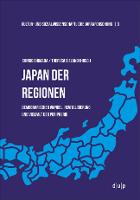Japan der Regionen
Demografischer Wandel, Revitalisierung und Vielfalt der Peripherie
Contributor(s)
Shimada, Shingo (editor)
Sieland, Theresa (editor)
Language
GermanAbstract
In view of challenges such as structural weakness, ageing and depopulation, it has become more important than ever in Japan since the 2011 triple disaster to revitalise rural regions with the help of various bottom-up and top-down initiatives. Not only are regional residents to be strengthened in their ties to their homeland, but peripheral areas themselves are to be staged as attractive working and living spaces and restructured in the long term. "Post-colonial" dependencies on economic powers in the big cities, socio-economic disparities between urban and rural areas, and failures in long-term planning and knowledge development are only a handful of the causes that shape the challenges of rural provinces today. From grassroots initiatives to save traditional matsuri to anime tourism and marriage migration, the volume reports on the background, consequences and interactions of the problems in Japan's regions. The third volume of the series "Kultur- und Sozialwissenschaftliche Japanforschung" (Cultural and Social Science Research on Japan) thus portrays a Japan of the regions whose image is always shifting between nostalgic retreat and disconnected countryside, invigorating alternative to the big city and deserted ghost village.
Keywords
Cultural and Social Science Research on Japan; Demographic change; revitalisation of Japanese regions; remigration; Furusato-zukuri; marriage migration; rural Japan; Anime Tourism; Iwami; Echigo-Tsumari Art Triennale; post-colonial dependency; socio-economic disparities; traditional matsuriDOI
10.1515/9783110657388ISBN
9783110657388, 9783110657364, 9783110657388Publisher
De GruyterPublisher website
https://www.degruyter.com/Publication date and place
Berlin/Boston, 2019Imprint
düsseldorf university pressSeries
Kultur- und Sozialwissenschaftliche Japanforschung, 3Classification
Cultural studies
Population and demography


 Download
Download Web Shop
Web Shop